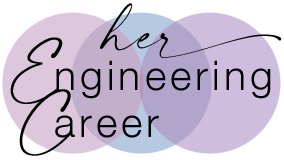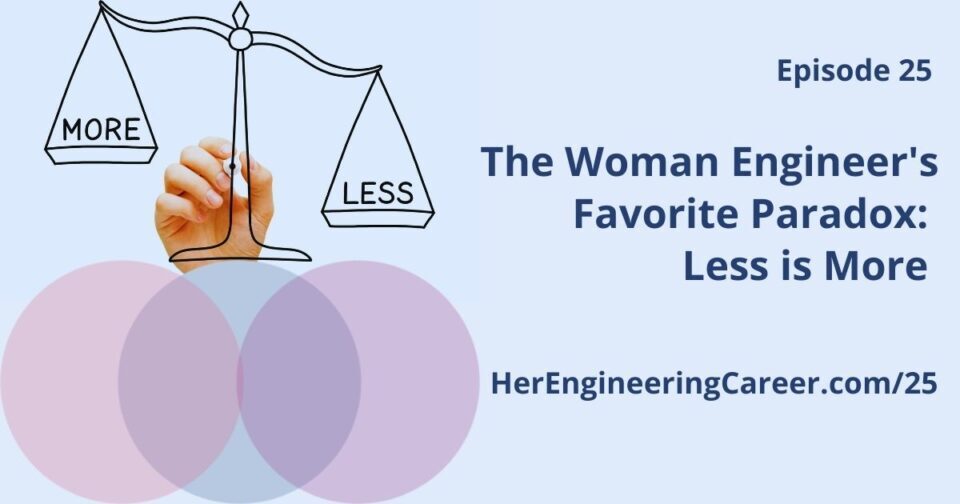Show Notes
I love a paradox. It’s mysterious and magical and useful all at the same time. I’ll explain the paradox of Less is More, and then I’ll share with you how you can make it work for you in your career.
Of course you need more time. More time to get work done. To check off your to-do lists. To meet your deadlines. If you could just add an extra 10 or 15 minutes at the end of the day. You just have to finish one more thing, do one more task, send one last email.
But in reality, even if you had 10, 20, or 60 extra minutes, it would not be enough. Work is never done. There is always more to do. (We talked about this in Episode 10 on Time Satisfaction. It’s one of my favorites.)
Here’s the thing: If you stop working at the designated time, take your breaks during the day, and use your vacation time, it doesn’t seem like there is more work left undone than if you didn’t do those things.
This is the paradox.
Staying late and skipping breaks and vacations does not result in less unfinished work. Thus less time in the office feels the same as more time in the office.
Less is More.
Since I am an engineer and I like things to be logical, I had a hard time wrapping my head around this idea. It didn’t make any sense. I didn’t believe it…until I tried it.
I know now that I don’t need to prove myself. I know now that my worth is not defined by my work. I know now that being productive doesn’t mean constantly being busy.
But there was a time when I didn’t quite get that. I was in the habit of taking advantage of every available minute in my working day.
As a mom engineer, I couldn’t afford to work many extra hours, but I often neglected breaks, worked through lunches, or stayed a bit longer at the end of the day.
If I found a few extra minutes here or there, you can bet I was onto the next task, diligently filling up every second in an attempt to catch up or even get a little ahead.
One day a mentor of mine challenged me to stop doing this. Though I didn’t really understand it at the time, he was telling me to be more mindful of the work I was doing. To think about how I enjoy my work. How the quality is more important than the quantity.
Don’t try so hard to squeeze more work in, he said. Stop working at the end of your work day and go home. Then see how you feel the next day. It’ll make a positive difference.
He was very confident. I was very skeptical.
I can remember thinking, and probably saying, But, but, but…you don’t understand how much work I have to do. It will just put me farther behind.
He gave me a knowing smile. Just try it, he said.
Testing the “Less is More” Paradox in Your Engineering Career
It took me a while. I couldn’t bring myself to test out his challenge until I had a bit of a lull between projects. I thought, this’ll be a good time. I can prove him wrong without risking too much.
On a carefully selected day, I consciously stopped working several minutes before 5pm – my usual going-home time. I used those minutes to clean up my workspace and think about a couple tasks for the next day. Then I gathered my things and walked out the door at 5 o’clock.
It was not an easy thing for me to do. For someone used to cramming in last-minute tasks at the end of every work day, it felt pretty weird. It felt like I was shirking work and cutting out early.
There was some mental effort required to allow myself to leave. If I was to make this a habit, it would take some practice. It would take some getting used to.
But remarkably, once I left, that weird feeling changed into the pleasant realization that I didn’t have to rush. My commute home was less stressful, and I had a few extra minutes to breathe before making dinner – or whatever else I had to do that evening.
It was noticeable. It was nice.
And the next day I was both amazed and a bit bewildered. Had the fact that I didn’t use another 20 minutes to get ahead cause me to have more work to do the next day? No.
Did I come into the office feeling behind or pressed or further buried under? Not at all. In fact, I felt calmer and refreshed.
Maybe there was something to this idea after all. My mindset began to change, and I was motivated to make this a new habit.
For much of what we do, catching up is a fallacy. And getting ahead? Ahead of what? You do your work. You make progress. You feel accomplished. You reach goals. You have impact.
All of this is important and serves a purpose. But you never get to the point where there is no more work. Work is always there.
What does it matter if you reach a goal seven minutes faster? In the grand scheme of things, that’s a drop in the ocean. And will there be less work to do tomorrow? No.
We all have deadlines. But not all deadlines are critical. And consider that, by easing up and putting more intention into your work, you can end up with a better product or more effective result with less brow-furrowing and gnashing of teeth.
Putting in Less Time for More Career Benefit
There are benefits to keeping a reasonable work day and limiting extra hours. Spending less time at work – taking breaks, taking vacation, and leaving on time – is what keeps you efficient and enables quality work.
It keeps you well and balanced by giving you time with family, community, and yourself. By reducing stress, it increases your resilience, improves your outlook, and reduces your risk of chronic disease. And this doesn’t even mention the economic benefits.
So I challenge you to test the Less is More paradox. See how you can reduce the extra hours you put in. Ease up on yourself. Focus on more quality and less quantity. Here are 3 ideas you can experiment with:
- Like I did, stop working a few minutes early, tidy your work area, and leave the office on time.
- Make your lunchtime more leisurely by not combining it with work at your desk. Instead, have lunch with someone else. Add a short walk outside. Or try a new local restaurant serving healthful food.
- Insert a break into your day when you can take a few minutes to view nature, get a drink of water, or do some relaxation breathing.
You might be a person who struggles with these kinds of habit changes. One of my Strategy Sessions can help you get motivated, come up with a plan, and find accountability. So check that out. These are the habits that make a difference in your career.
Try one of these 3 ideas – or come up with your own – and see how it makes a difference for you. It’s not a trick. Less is More. It’s a mysterious, magical and useful paradox.
Recap: Today’s episode is a fun story about the paradox of Less is More. We started with an explanation of the paradox that less time in the office is the same as more time in the office with respect to getting work done.
We talked about the benefits of less quantity (reducing extra hours) and more quality (higher quality work), including more balance and less stress. And finally I offered a few suggestions for how you can put the less-is-more paradox into action at work.
Next time on Her Engineering Career Podcast we’ll explore some skills to help you with speaking and giving presentations – something that engineers typically do a lot. So be sure to tune in next time for Episode 26.

